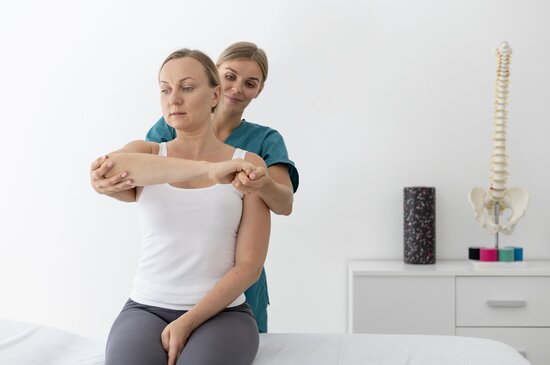The menopause marks a significant turning point in a woman's life and entails a host of physiological changes. One of the most serious is the accelerated loss of bone mass, which significantly increases the risk of osteoporosis.
Osteoporosis is a disease that causes bone mass to decrease and damages the microarchitecture of the bone tissue. This makes the bones more susceptible to fractures, especially:
To minimise the risk of fractures, preventive measures are particularly important during the menopause.
These include:
- A balanced diet rich in calcium and vitamin D
- Regular exercise, especially strength training
- Targeted support through dietary supplements
During the menopause, the level of oestrogen in the body drops drastically. This hormone is crucial for healthy bone metabolism because it:
- Inhibits the loss of bone mass
- supports the formation of new bone tissue
A lack of oestrogen can cause bone density to decrease more quickly. This increases the risk of fractures, especially:
- the spine
- the hips
- the wrists
Why is bone health so important during menopause?
The rapid loss of bone density makes preventive measures crucial. A balanced diet, exercise and targeted support can help to minimise the risk of osteoporosis and fractures.
Ideally, as much bone mass as possible should be built up before the menopause starts. But even after the onset of the menopause, it is never too late to take action.
Preventive measures for strong bones
By taking the right steps, you can positively influence the course of osteoporosis and reduce the risk of bone fractures. Combine it with:
- A healthy lifestyle: A balanced diet with sufficient calcium and vitamin D.
- Targeted exercise: Regular strength and weight training helps to strengthen the bones.
- Medical support: In consultation with experts, therapies or dietary supplements can be useful.
It is never too late to start boosting your bone health and navigating the menopause in great shape!
A balanced, calcium-rich diet is essential for strong bones. Good sources of calcium include:
- Dairy products
- Green leafy vegetables
- Fortified foods
Vitamin D also plays a key role as it aids the absorption of calcium in the body. It can be absorbed through sunlight or, if necessary, through dietary supplements. Products such as ricare® Menopause Support provide calcium and vitamin D and can enhance your sense of well-being during the menopause.
Regular exercise is also crucial to slow down the loss of bone density or even increase bone mass. The following activities are especially effective:
- Strength training
- Walking, dancing or climbing stairs
Studies show that targeted muscle training sustainably promotes bone health. Choose activities that you enjoy and that can be easily integrated into your daily routine.
Healthy lifestyle:
Giving up smoking and reducing your alcohol consumption will have a positive effect on bone health. These measures can also help to protect your bones in the long term.
Medical advice: Find personalised solutions
If you are at increased risk of osteoporosis, it is advisable to seek advice from specialists. In certain cases, hormone replacement therapy (HRT) can be useful to compensate for the lack of oestrogen. However, the decision to take HRT should always be made for you as an individual and weighed up carefully.
The menopause is a crucial phase for your bone health. You can actively help minimise your risk of osteoporosis by adopting a healthy lifestyle, taking regular exercise and eating a balanced diet. If you are unsure, seek advice from a specialist to develop personalised strategies. Prevention and early action are the key to ensuring your quality of life in the long term.




